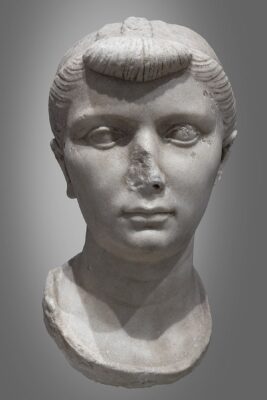Julia (Iulia) was born in 39 BCE as the only daughter of Emperor Octavian Augustus and Scribonia. The emperor divorced Scribonia on the same day that she gave birth to Julia.
In 37 BCE as a 2-year-old child, engaged to Antony Antyllus, son of Marcus Antony’s triumvir. This marriage did not materialize after breaking the covenant between Augustus and Mark Antony. In 35 BCE promised to the Geta king Cotison. Julia’s subsequent marriages were always concluded for political reasons, at Augustus’ request. In her first marriage, she was the wife of Marcus Marcellus – the nephew of her father Augustus. Two years later, Marcellus died (23 BCE), and Julia married her father’s closest friend Marcus Agrippa in 21 BCE. After his death (12 BCE), she married Livia’s son Tiberius. She divorced him in 2 BCE. From the marriage with Marc Agrippa, she had five children, they were: Gaius Caesar, Julia, Lucius Caesar, Agrippina and Agrippa Postumus. With Tiberius, she had one child who quickly died.
Suetonius writes that Augustus raised his daughter strictly. It was he who forbade him to speak or read anything secretly that could not be written in his home journal. He also made them used to spinning because he wore things sewn only by his wife, daughter or granddaughter.
After Marcellus died in 23 BCE, Augustus had to look for a new husband candidate for his daughter. The choice fell on Agrippa. This choice may have been dictated by the recollection of that year’s crisis, which almost led to upheaval. Augustus was seriously ill at the time and had to think about his successor. After Agrippa’s death, the problem of the future spouse appeared again for Julia, and this time Tiberius was the best candidate, who first had to part with his first wife. When Tiberius left for Rhodes (6 CE), Julia began a scandalous lifestyle. According to some of our contemporaries, ancient historians tell many repeated anecdotes about Julia. They talk about her coquetry, about the immodest clothes that made Augustus furious. Julia became a symbol of the iniquity that was to be hidden in the darkness of the imperial palace. One would like to say that she was her father’s daughter because in his youth Augustus was known for his love adventures. However, this was not morally correct when it comes to a woman. It is not known whether Augustus knew about her exploits. Among her lovers were, among others, Antonius Iullus, Tiberius Quinctius Crispinus, Tiberius Sempronius Gracchus, Appius Claudius Pulcher and Cornelius Scipio, representatives of the most famous Roman families.
Cassius Dio says he was the last to know about it. It can be speculated here that he did not know. In Rome, however, it was difficult to hide anything, especially if it concerned the imperial family. Velleius Paterculus cites a list of her friends. Undoubtedly, her scandalous lifestyle was ended after three years. Seneca the Younger describes:
The late Emperor Augustus banished his daughter, whose conduct went beyond the shame of ordinary immodesty, and made public the scandals of the imperial house. Led away by his passion, he divulged all these crimes which, as emperor, he ought to have kept secret with as much care as he punished them, because the shame of some deeds asperses even him who avenges them.
– Seneca the Younger, De Beneficiis, 6.32
In 2 BCE Augustus found out about everything. The case was brought to the Senate, Augustus sent Julia the divorce papers on behalf of Tiberius. The anger of princepsa spared no one, even her lovers and helpers, in this scandalous life. Julia was exiled to the island of Pandataria (now Ventotene, Italy). As Suetonius (Augustus, 65) writes: “and even thought of putting her to death”, this disgrace hurt him so much. “After Julia was banished, he denied her the use of wine and every form of luxury, and would not allow any man, bond or free, to come near her without his permission, and then not without being informed of his stature, complexion, and even of any marks or scars upon his body”, so she lived in very harsh conditions. Her mother, Scribonia, who voluntarily accompanied her, remained her only companion. When Julia gave birth to her son on the island, he did not recognize him and forbade him to feed him. Julia was later allowed to move to the Regium. After Tiberius ascended the throne, her conditions of stay were tightened, leading to her death.
She died in 14 CE in Regium (southern Italy). In his will, Augustus also forbade her to be buried after she died in a joint tomb.

